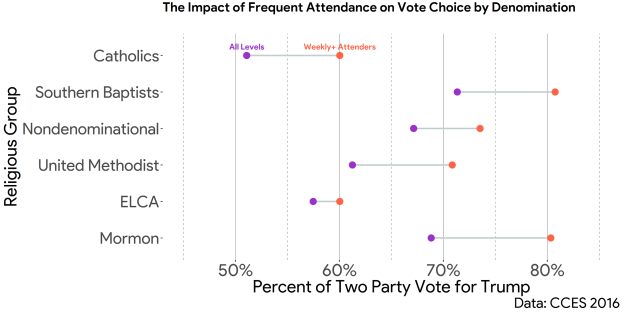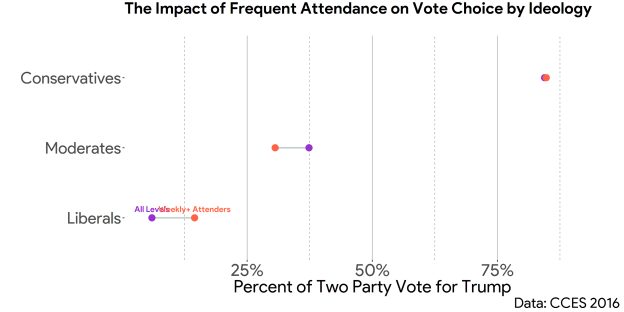Featured Image Credit: Patheos
by Ryan P. Burge, Eastern Illinois University
I’ve been watching with a little bit of puzzlement about the recent media coverage of the Poor People’s Campaign. I thought this piece on Rev. William Barber was especially good. It seems that the media forgets that it’s possible to be a Christian and a liberal in the United States. I constantly remind people that the dominant (public) theology in this country among Protestant Christians in the early 1900’s was the social gospel, which was deeply intertwined with socialism.
So, I had a little research question in my mind that I was toying with: does frequent church attendance for a certain segment of the American public indicate a drift toward the left of the political spectrum? The theory is simple: if exposure to something leads to a change in behavior or opinion, an extreme amount of exposure should lead to a noticeable change. So, I did some simple tests. I compared the entire range of attendance options to only the subset that actually attends religious services multiple times a week. I wanted the variable of interest to be something straightforward: the percent of two party vote for Donald Trump. So, are there some cases in which attending a church a lot actually results in a more liberal voting pattern?

The graph above looks at this problem from a racial angle. Do weekly attenders vote for Donald Trump more frequently? The answer is clearly yes. Consider this: Donald Trump garnered 48.7% of the vote in general, but he received 64.7% of the votes cast by those who attended church multiple times a week. This effect looks even more significant when we look at this through a racial lens. For instance, while there isn’t a statistically significant difference between the entire black sample to only those who attend church more than once a week, it had a tremendous impact on vote share for whites, hispanics, and asians. Trump garnered 83.2% of the white vote among those who attended church multiple times a week. That means he did really well not necessarily with white evangelicals, but white people who went to church a lot (regardless of what kind of church they attended).

Is the impact of frequent church attendance mediated a little bit by education? Maybe those who have a higher level of education are less influenced by frequent church attendance? The answer to that question is an odd relationship. The group that was the most impacted by frequent church attendance was those who achieved a four year degree. Trump won 43.8% of the vote of those with a college degree. He won 69.4% of the vote of those who had a college degree and attended church frequently. That’s more than a 50% increase. The increase for those with only a high school education was the smallest of the bunch (9.4%), but it was higher to begin with too. For those with the highest level of education, Trump garnered 37.3% of the vote overall but 56.6% of the vote for those who attended multiple times a week (which is a 50% increase).

To circle back to the original theory that this analysis was testing, there *has* to be some church that would influence individuals to vote for the Democrat, right? Exposure to a liberal message should drive up Democratic sentiments. It just seems likely. Well, I tested that idea as well. I took several of the major Christian denominations and compared all adherents to just those who attended multiple times a week. The results are in the graph above. Sixty percent of Catholic frequent attenders voted for Trump, compared to only 51.1% of Catholics as a whole. For Southern Baptists, the increase was also relatively small (71.3% -> 80.8%), the effect for non-denominational folks was nearly the same as well (67.1% -> 73.5%).
Turning now to two denominations that have consistently been labeled mainline: the Evangelical Lutheran Church of America (ELCA) and the United Methodist Church. The results for the United Methodists are clear and convincing: for those that attend the most frequently, they were clearly in Donald Trump’s camp (70.9%). But for those in the ELCA, there is no statistical difference between the two groups. That means that mainliners who attend church a lot are either a) not being exposed to liberal messages and/or b) those liberal messages are not having any impact on their vote choice in the ballot box.

Finally, what about political ideology? The graph above breaks the sample into those who identified as liberal, moderate, and conservative. For conservatives, there is no difference at any attendance level. Their support for Trump was obviously strong. But, even for liberals, there is a small (but statistically significant) increase in Trump’s support among those who attend church multiple times a week. Trump only garnered 6% of the liberal vote in general, but 14.5% of liberals who attended the most frequently. The one finding that I can make zero sense of is that moderates who attended at the highest level were actually less likely to vote for Trump than moderates in general. The difference is small (6.8%) but is still puzzling.
Taken together, these results strike a serious blow to anyone who wants to put a great deal of stock in the “Great Awakening of the Religious Left.” My first question to anyone who advocates that is a simple one: where is that awakening coming from? I can find NO instance where the most frequent church attenders were more likely to vote for Hillary Clinton than those who attended at all levels. This is true across racial and educational lines. If an individual wants to be deeply devoted to Christianity in the United States, they are going to have a hard time finding a church that also encourages voting for candidates from the Democratic Party. Christianity in America is now deeply intertwined with conservative politics. It’s impossible to know if the pendulum can swing back the other way or if this represents a “brave new world” of American religion.
Ryan P. Burge teaches at Eastern Illinois University in Charleston, Illinois. He can be contacted via Twitter or his personal website.
Full coding syntax for this analysis is available on my Github.

I think that there is a further breakdown in the number of church-attending, college-educated neoliberals who voted Republican-Trumpian, and it concerns their college major.
I suspect that the church active, neoliberals (which is what we are really talking about) who voted Republican-Trumpian were mostly business majors. I suspect, as well, that no church-attending progressives voted Republican-Trumpian at all, likely because they majored in the Humanities–which includes a good dose of ethics and justice.
In my college experience, I discovered that the few business majors in my ethics classes detested the subject. I think that is because many (most?) business majors see the population in terms of psychological profiling for targeted, motivational marketing as a means to the highest possible, personal profit. There is no room for ethics when ones primary motivation is personal profit and being a solid member of a church is a perfect means of placating one’s conscience, getting votes and, amazingly, securing trust.
I’d like to see a professional, objective analysis of the majors of the college-educated “liberals” who voted for Trump and those liberals who voted for either Hillary Clinton in the general and those who voted for Bernie Sanders in the primary.
LikeLike
[…] Provocative number-crunching indicated that across almost every stratum, frequent church attendees more were more likely to vote for Donald Trum…. […]
LikeLike
[…] an article titled “Searching for the Religious Left” published Thursday by Religion In Public, Burge posed the question of whether regular church […]
LikeLike
[…] an article titled “Searching for the Religious Left” published Thursday by Religion In Public, Burge posed the question of whether regular church […]
LikeLike
[…] an article titled “Searching for the Religious Left” published Thursday by Religion In Public, Burge posed the question of whether regular church […]
LikeLike
[…] an article titled “Searching for the Religious Left” published Thursday by Religion In Public, Burge posed the question of whether regular church […]
LikeLike
[…] an article titled “Searching for the Religious Left” published Thursday by Religion In Public, Burge posed the question of whether regular church […]
LikeLike
[…] this to Evangelical and other religious voters where those who attend religious services more frequently have been more likely to vote for and support President Trump since the […]
LikeLike
[…] Searching for the Religious Left […]
LikeLike
[…] they do exist they are not bubbling up in this data. This reinforces an earlier post I wrote called Searching for the Religious Left. In almost every case, those who attended church the most were much more likely to vote for Donald […]
LikeLike